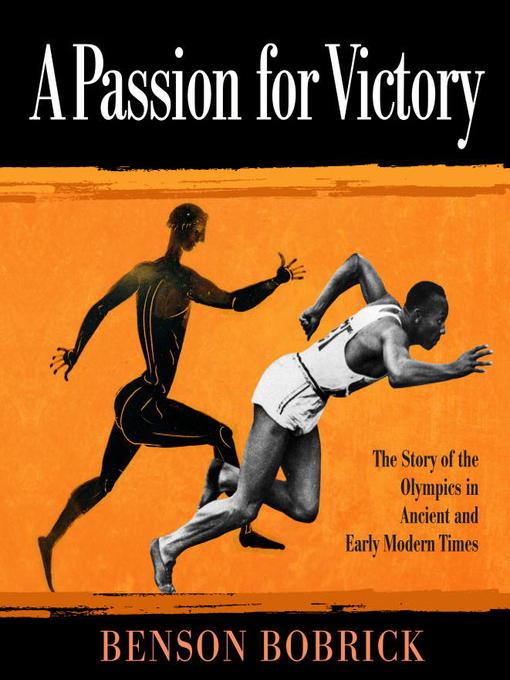
A Passion for Victory
The Story of the Olympics in Ancient and Early Modern Times
فرمت کتاب
ebook
تاریخ انتشار
2012
Lexile Score
1220
Reading Level
8-11
ATOS
9.3
Interest Level
4-8(MG)
نویسنده
Benson Bobrickشابک
9780307974471
کتاب های مرتبط
- اطلاعات
- نقد و بررسی
- دیدگاه کاربران
نقد و بررسی

May 15, 2012
From the first Olympics in 776 B.C. to the 1936 Berlin Olympics, a good portion of world history is told through the lens of sport. The first Olympics were held in a meadow in Olympia, Greece, to seek favor from the gods. The games always have spawned superstars, and such legends as Milo of Croton, Jim Thorpe, Johnny Weissmuller and Jesse Owens are given their due here. The photo-essay format conveys their stories effectively, as well as the glory, shenanigans and pettiness of the Olympics throughout history. Almost every full-page spread includes at least one photograph, and the text adroitly addresses the cultural context of the games. This is especially effective in the discussion of Jesse Owens, who won four Olympic gold medals in Berlin. Bobrick points out how, despite Hitler's views on non-Aryans, the German public adored Owens, and Owens could stay at any hotel, eat in any restaurant, and use all public transportation without interference, something he could not do at home in the United States. If the modern Olympics haven't always succeeded in the original goal of currying the gods' favor, they have always been, among other things, a grand celebration of the human spirit and the urge to achieve athletic greatness. A fascinating account of the Olympic Games and their place in history. (chronology, prologue, appendix, source notes, bibliography, index) (Nonfiction. 10 & up)
COPYRIGHT(2012) Kirkus Reviews, ALL RIGHTS RESERVED.

July 1, 2012
Gr 5-10-This engaging and informative history delivers a lively overview of the Olympic Games from ancient Greece to Early Modern Times (1948). Drawing on a wealth of resources from Homer to the Huffington Post, Bobrick describes the athletes, traditions, popularity, and ferocity of the ancient Games; the Christian banning of the "pagan" Games in AD 394; the 18th-century rekindling of European interest in ancient Greece; the passionate leadership of French Baron Pierre de Coubertin, who revived the Olympics in 1896; and the potent mingling of Olympics and international conflicts in the 20th century. Fascinating biographical anecdotes are woven into this historical, sociopolitical account. Despite challenges across the centuries from scandals, nationalism, economic hard times, and violence, the Olympic Games have endured as a transcending exhibition of athleticism, inspiration, celebration, and innovation. Although this timely overview stops in 1948, Olympic enthusiasts will enjoy Bobrick's dynamic, readable, contextual account of the origin and evolution of the Games and the Olympic spirit. Black-and-white photographs, a chronology, chapter notes, an index, and an extensive bibliography enhance the usefulness of this title for research. Coverage of more recent Olympic Games and medalists is available in Dave Anderson's Story of the Olympics (Morrow, 1996) and Nick Hunter's Inside the Olympics (Raintree, 2012).-Gerry Larson, formerly at Durham School of the Arts, NC
Copyright 2012 School Library Journal, LLC Used with permission.

Starred review from June 1, 2012
Grades 6-9 *Starred Review* Supported by loads of fascinating quotes, this history of the ancient and early modern Olympics shines. With a fleet-footed narrative voice, Bobrick introduces the ancient Greek culture that gave birth to athletics as both a demonstration of military prowess and an honored career path in its own right. Although many of the events featured in early Olympic games are recognizable today, the details of such lost sports as the pankration, which would put Ultimate Fighting to shame, and chariot races make for fascinating reading. Moving forward, Bobrick discusses how the Olympics enjoyed nearly a millennium of good times until being co-opted and eventually shut down by the Roman Empire; sputtered through a few false starts in the seventeenth and eighteenth centuries as the modern world remembered and came to revere the ancients; and then, finally, took hold at the turn of the twentieth century under the leadership of Pierre de Coubertin. The second half of the book deals mainly with the lead-up to and events during the 1936 games in Berlinpausing to make the shameful point that Jesse Owens felt more discrimination at home than he did in Nazi Germany. Per the subtitle, everything Olympics related that happened after WWII is relegated to a lengthy epilogue, and the appendix only lists medal records up to the 1948 games. This is, however, as fine a point of entry into Olympics glory as you could want: readable, entertaining, informative, stocked with telling photos and reproduced artwork, and sourced with detailed notes and a deep bibliography. And right on time, too.(Reprinted with permission of Booklist, copyright 2012, American Library Association.)

























دیدگاه کاربران